What is the best browser for the Internet on a laptop. Memory consumption by browsers
Which browser is the fastest? When Google introduced Chrome, the focus was on the performance of the new browser.
Google regularly performed performance tests that demonstrated the performance superiority of Google Chrome over other popular browsers, such as Firefox or Internet Explorer.
Today, Chrome is the market leader. Microsoft is trying to make a difference with its new Microsoft Edge browser. Opera, after switching to the Chrome engine, had to practically recreate its browser from scratch, and Mozilla is constantly improving its Firefox project.
What About Google? It looks like the company is losing market share in the browser. This does not mean that the browser does not work in the best way for users, but only is a consequence of the conservative position of the company in terms of the development of the project.
Speed is not the only important factor for a browser. Support for modern web standards, built-in useful functions for performing everyday tasks, security and privacy features, subjective performance and support for various extensions are of great importance.
We will focus solely on the performance factor, but each user should choose their own browser selection priorities.
Browsers
Performance tests were performed on two different Windows 10 operating systems - one is the latest stable build and the other is the latest Windows Insider pretest build.
Computer 1 (Windows 10 stable version)
- Google Chrome Dev (version 53.0.2767)
- Microsoft Edge Stable (version 25.10586)
- Mozilla Firefox Nightly (version 50.0a1)
- Opera Developer (version 40.0.2267.0)
- Vivaldi (1.3.501.6)
Computer 2 (Windows 10 Insider Preview)
- Google Chrome Stable (version 51.0.2704.103)
- Mozilla Firefox (version 47.0)
- Microsoft Edge (version 38.14371)
- Opera (version 38)
- Vivaldi (version 1.2)
Benchmarks
The test used the following benchmarks to check the performance of all tested browsers:
Each benchmark was run twice with no background activity.
results

The results are amazing. Chrome's performance on 1st machine was not very good in 2 out of 3 benchmarks, especially when compared to Opera and Vivaldi, which use the same engine. The issue may be caused by a specific Chrome build.
Microsoft Edge performed well in JetStream and Octane, but performed much worse in Speedometer. It is a little surprising that there are major differences between browsers that use an identical engine.
Chrome showed lower performance than Opera and Vivaldi in JetStream and Octane, but outperformed those browsers in Speedometer.
On the other hand, Vivaldi outperformed Opera at Speedometer.
A similar picture is observed on the 2nd computer. Microsoft Edge was fastest in two benchmarks, but came in last in Speedometer.
Chrome Stable performed roughly on par with Opera and Vivaldi in the first two benchmarks, but Opera's Speedometer scores were significantly different from those of Chrome and Vivaldi.
Since the advent of the world wide web, called the Internet, surfing has begun to develop at a frantic pace. Web browsers are used as the main tool. But not all of them are equal in their capabilities and the load that they can exert on the system. Let's try to figure out which browser loads the system the least, taking into account the main technical characteristics and reviews of ordinary users.
What is the load on the system?
To understand the meaning of the load, one should directly examine the currently loaded content contained on a particular web resource. It is clear, after all, that if the site is a resource on which only text is presented, there is nothing to talk about. The system reads the text in any encoding and does not particularly strain.
The question of which browser puts the least load on the system should be considered in terms of multimedia content or development tools provided by the browsers themselves.
If we talk about multimedia, it should be borne in mind right away that the processing tools provided in the main versions of the programs are often supplemented by a fairly large number of special plug-ins. Take at least the same Adobe Flash Player, which is responsible for high-quality reproduction of animation, graphics and sound.

Thus, the actual question will be not so much about which browser eats the least resources, but about how resource-intensive the additional plug-in is, because the browser itself in its pure form may not work with some elements of web pages.
Basic performance parameters
If we consider the main characteristics of the most famous and most often used tools, in the first place for any user or expert tester is the speed of launching the program itself from an executable file and the speed of opening pages.

Unfortunately, many users trying to figure out which browser loads less CPU or RAM often miss the application start parameters. So to speak, in their pure form after installation, they all start quickly enough. This is only due to the fact that they have no plugins connected, the cache is not full, there is no history of visits, etc.
Over time, any, even the most sophisticated browser with a bunch of gadgets turns into a clumsy bumpkin. The saddest thing is that even deleting temporary files does not help. And if you take into account the initialization of plug-ins at the start of the program, in general, you should think about the advisability of installing them.
Some applications have their own set that cannot be deleted, but can be disabled. So, for example, Chrome comes with built-in components like Adobe Flash Player or AdBlock. While everything is clear with the first plugin, the second sometimes causes legitimate criticism. It is responsible for blocking ads, pop-ups and banners, and can also prevent some auto-executable scripts and applets embedded in web pages from running. And all this takes a lot of time.
The opening of pages with preliminary content analysis directly depends on the content. Any modern browser takes a split second to do this. Again, it all depends on the plugins - the more there are, the slower the program runs. Incorrectly installed or incompatible add-ons slow down the system even more.
Which browsers use less memory?
But let's start checking the very means of Internet access. Here you should take into account the consumption of RAM, virtual and physical memory. If you understand the question of which browser loads the system the least, you should pay attention to the basic default settings and the size of the allocated cache.
Cached data, although it allows opening the most frequently visited pages by saving some elements on the hard drive, nevertheless can clog the system too much and cause programs to freeze effects. This is due to the constant analysis of the loaded structural elements of the pages. With a sufficiently large number of them, more time is required for analysis and loading.
In this regard, Internet Explorer 11, Edge from Windows 10, Mozilla and Google Chrome show the best indicators, judging by user and expert reviews. Opera, although a very popular means of accessing the Internet, is much slower. In addition, today there are so many versions of the program in unofficial sources that you do not always know whether this product is safe.
and reviews
If you look at it, you can make a list, in which, as you would expect, there are only programs of the most famous developers:
- Internet Explorer;
- Edge;
- Opera;
- Mozilla Firefox;
- Chrome.
I could add here some programs like Amigo, Yandex Browser, 360 Safety Browser or something else. But they are not specifically included in the list, since they are built on the basis of Chrome and are not of interest as truncated or extended derivatives of the main product. Often, due to incomplete technologies and algorithms, problems arise in them much more than in the parent product. This is evidenced by the clearly unflattering statements of users.
Now we will dwell in more detail on the question of which browser loads the system the least.
Internet Explorer
Users had an extremely negative attitude towards IE, which is a part of any Windows operating system, since the early versions of the program were so incomplete that it was not even necessary to talk about any convenience of working on the Internet.

Over time, the developers at Microsoft revised the basic concept of the browser, resulting in the 11th version of the application. Whoever says anything, but Internet Explorer 11 in all respects spits both "Mozilla" and "Chrome", and even more so "Opera". The load is minimal, the start is much faster than similar applications, clearing the cache and temporary files does not require user intervention, as it was before (it was necessary to clear the Temporary Files folders manually).
Edge
The same Internet Explorer became the progenitor of a new generation browser called Edge, which appeared only in Windows 10 (for systems with a rank below the version is not provided).

This application rightfully occupies the top lines in all ratings. Most of the background processes when starting the program are automated, the start is made within a couple of seconds, the opening of pages, even without installing the accompanying plugins, is very fast. By the way, there is no need to install add-ons - everything is included here.
Another thing is that this browser is somewhat inconvenient to configure, especially in terms of disabling extensions. And the default start page (news, weather, advertising, etc.) is a little annoying. But all this can be turned off if you set a dummy at startup like how it is done in IE.
Opera
The notorious "Opera", although it is revered by many, has recently passed in positions. Despite the convenient and fairly simple interface, the performance leaves much to be desired.

Even at startup, you may notice too long access to the hard disk, as well as completely clearing the cache and deleting temporary files. True, the advantages include the ability to quickly configure, disable or remove extensions. But this in no way can affect the overall assessment.
Mozilla Firefox
The search for an answer to the question of which browser loads the system least of all cannot do without this browser.

Lightweight and fast - that's what we can say about it. However, not all users fully appreciate it. The fact is that Fire Fox cannot be regarded as the most primitive means of accessing the Internet. This browser is more suitable for web developers and can be used as a complete platform for building web applications. The toolkit is much wider than what the other favorites on the list have to offer.
Chrome and browsers based on it
Chrome is considered to be the fastest browser in existence. Developments based on it differ in speed only after the first installation, and over time they start to slow down incredibly.

And the speed of launch, and the speed of opening pages, and ease of setup or management - at a height. Plus - the largest number of plugins and extensions developed. The question is different. Should you install them? Everyone decides for himself. Nevertheless, in all the main indicators in the popularity lists, this browser is not inferior to Edge.
What to choose?
So, we choose Of course, preference (based on user reviews) could be given to Microsoft products, however, as it is believed, the best option would be to install Chrome.

And here not only technical characteristics or performance parameters with a minimum load on the system speak in favor of the choice. More broadly, you will notice that the latest version of the application supports RDP (Remote Desktop) technologies and can be used as the main client for connecting to computers and laptops, even from mobile devices.
Thus, the balance in the question of which browser loads the system the least, is the easiest to manage and configure, clearly tilts in favor of "Chrome", although this assessment is based solely on ratings, nothing more.
In order to understand which of the browsers is the lightest, you need to try to install at least a few of them. Then they are launched in turn (the main thing is that the conditions are the same, that is, the pages are the same).
To compare, take the following three Internet pages:
1.http: //lumpics.ru/about/
2.http: //www.samsung.com/se/tvs/all-tvs/

3.http: //ladio.ru/flash/en/index.html#

When each of the sites is open, you need to click on the "Task Manager" to look at the processor load, as well as memory.
Internet Explorer or Microsoft Edge
Desktop computers, as a rule, do not shine with good performance, so you can use what the system offers, that is, a standard browser. Of course, Internet Explorer is not so convenient and a small number of people use it, but it needs much less memory to work than the well-known browsers Google Chrome and Mozilla Firefox.
1. The Internet Explorer browser opens on the page http://lumpics.ru/about/. The "Task Manager" is called and it looks first of all "Memory" - 66.7 MB.


3. And now it's time to open the last page http://ladio.ru/flash/en/index.html#. In Task Manager, Memory appears as 84.9 MB.

In Windows 10, the default browser is different - Microsoft Edge. It looks quite promising. The browser is not loaded with various themes, plugins and extensions. Its opening speed is really impressive.
1. Launch Microsoft Edge and go to the site http://lumpics.ru/about/. We call the "Task Manager" and look at "Memory" - 14.8 MB.

2. In the browser, open the page http://www.samsung.com/se/tvs/all-tvs/. In Task Manager, Memory will be 17.6 MB.

3. Open the last page http://ladio.ru/flash/en/index.html#. In the "Task Manager", again, look at "Memory" - 23 MB.

Chromium
Chromium can be called a lightweight version of Google Chrome, which is perfect for a weak computer.
1. We open the browser and the first site from the list of tested ones - http://lumpics.ru/about/. In Task Manager, Memory will be 29.6 MB.

2. Launch the site http://www.samsung.com/se/tvs/all-tvs/. There will now be 36.1 MB in the Memory section of Task Manager.

3. We go to one more last site http://ladio.ru/flash/en/index.html#. In the Task Manager, Memory shows a figure of 48.1 MB. In this, as in the other screenshots above, you can see that there are a number of additional (background) processes that use no less, or even more memory.

Comodo dragon
Comodo Dragon works well on a weak computer. This browser has everything you need to surf the web.
1. Launch the browser and go to the page http://lumpics.ru/about/. The site in Task Manager uses 134.9 MB of memory.

2. Go to the page http://www.samsung.com/se/tvs/all-tvs/. In Task Manager, Memory will be 148.9 MB.

3. The last page is http://ladio.ru/flash/en/index.html#. In Task Manager, Memory shows 164.3 MB.

Opera developers have optimized the work of this browser to the maximum. On relatively weak computers, it works quite well, and this attracts a large number of users.
1. Open the browser and go to the site http://lumpics.ru/about/ according to the usual scheme. In the "Task Manager" pay attention to the "Memory" - 27 MB.

2. Go to the website http://www.samsung.com/se/tvs/all-tvs/. In the "Task Manager" "Memory" will appear - 31.7 MB.

3. Go to http://ladio.ru/flash/en/index.html#. In the "Task Manager" we look at the "Memory" - 35.7 MB.

Yandex browser
Yandex Browser has many opportunities in some areas, so it looks promising and lively.
1. Launch the browser and go to http://lumpics.ru/about/. The Task Manager will show 30.7 MB of memory.

2. Go to the website http://www.samsung.com/se/tvs/all-tvs/. In the "Task Manager" look at "Memory" - 37 MB.

3. And launch the last page http://ladio.ru/flash/en/index.html#. In Task Manager, Memory will be 42.7 MB.

Vivaldi is a browser from the developers of Opera. It has many unique features and modes that make it stand out from the crowd.
1. Launch the browser and go to the page http://lumpics.ru/about/. In the "Task Manager", pay attention to the "Memory" - 22.7 MB.
Greetings, friends. A couple of days ago, an acquaintance of mine asked me for advice: what browser best bet on old pc? The question drove me into a dead end, I somehow never thought about such things. And since an acquaintance is still waiting for advice from me, I decided to delve into this topic and form my answer.
Browser, or web browser - application software for viewing web pages, the content of web documents, computer files and their directories; web application management; as well as for solving other problems.
Let's start with the most common browsers. The fact is that Google chrome, Opera and Mozilla Firefox refused to support Windows XP and Vista... That is, the latest versions of these browsers cannot even be installed on outdated laptops and PCs. And even if it works out, old PCs will not have enough RAM for the normal operation of these browsers. Using older versions is not the best solution. Web standards are not static, which means that using older versions of browsers we will see distorted rendering of modern websites. Otherwise, we will not see individual elements of Internet pages at all.
Nevertheless, there is still a choice. Today I will tell you about four modern browsers that will work great on old PCs and laptops, successfully coping with all the standard tasks.
K-meleon
K-Meleon has been around for over ten years. It is a Mozilla browser that includes Firefox's Gecko engine. The browser's user interface design is very similar to that of regular Firefox. Like Firefox, K-Meleon has ample opportunities for customizing the toolbar, menus, hotkeys.

Although you won't be able to add Firefox extensions to K-Meleon, this browser still has a lot of handy plugins.
K-Meleon is also the fastest browser that can even run on Windows 95, not to mention XP, Vista and other operating systems.
Cons: K-Meleon is rarely updated. The last stable version of the browser at the time of this writing is 75.1, released in 2015. There is a Russian-language localization.
Download K-Meleon from the official site. Pay attention to the heading “Latest Stable Release” - select one of the versions: Download installer, which requires installation, or portable, which does not require installation.
Midori
Midori's creators developed the browser as an alternative to more bloated software products. While other browsers are growing in size all the time, Midori remains minimalistic - the browser "weighs" only 37.7 megabytes. And since older PCs usually don't have a large hard drive, this can be a key factor when choosing a browser.

Despite its small size, Midori works great with all the latest web technologies, including HTML 5 and CSS 3.
Midori was developed on top of the webkit engine, which ranks it in the same family as Chrome. The browser does not have a repository of extensions, but several settings are available in it, with which you can customize Midori to your needs.
Midori has both an installation version and a portable one, which can be used without installation on a PC, for example from a USB flash drive or CD / DVD disc.
Download Midori from the official site. Choose one of the versions: installer, which requires installation, or portable, which does not require installation.
Pale moon
Pale Moon - This browser is a fork of the Firefox source code. It is essentially a stripped-down version of Firefox that runs on Windows XP and Vista. Pale Moon requires only 256 megabytes of free memory and is optimized for modern processors. This browser makes efficient use of system resources, which allows it to run on older PCs and laptops with enviable speed.

Pale Moon has a very similar interface design to older Firefox versions. Many of the extensions that are available for Firefox will be compatible with Pale Moon as well. In addition, this browser has its own exclusive add-ons. The browser also has settings for many of the options for tabs, page content, and more, just like Firefox.
Update articles from 21.12.2018... As one of the readers of my blog correctly noted, after a recent update, the Pale Moon browser has become more demanding on computer resources. Now the system requirements are as follows:
- Windows 7/8/10 / Server 2008 R2 or later;
- 1 GB of RAM;
- at least 200 MB of free disk space.
Download Pale Moon from the official site. Hover your cursor over the “Download” menu, then “Pale Moon” and select one of the available browser versions.
Maxthon 5
The fourth and last browser for today that I want to show you is Maxthon 5. This is a promising software that continues to actively develop. The system requirements of the browser are very modest: a 1 GHz processor, 512 megabytes of RAM and 64 megabytes of hard disk space.
 Hello everyone. It seemed to me that I am well versed in hardware and software. Well, maybe it’s not that it’s superb, but enough to advise you on how to solve this or that problem related to software or hardware. So. But if six months ago someone asked me what is the fastest browser in the world, then I would answer Mozilla. And I would be right, because if you do not delve into the topic of browsers, then it seems like how exactly Mozilla loads the website page the fastest.
Hello everyone. It seemed to me that I am well versed in hardware and software. Well, maybe it’s not that it’s superb, but enough to advise you on how to solve this or that problem related to software or hardware. So. But if six months ago someone asked me what is the fastest browser in the world, then I would answer Mozilla. And I would be right, because if you do not delve into the topic of browsers, then it seems like how exactly Mozilla loads the website page the fastest.
But I was wrong .. And it all happened when I bought a board with an unsoldered Atom 330 processor on the cheap - small and remote. It has two cores, but there is Hyper-threading technology, that is, threads are present as a result of 4 threads, and in Windows it is shown as 4 cores. Well, I thought, that's great, but I got a little upset when I realized that the performance is certainly not enough. Well, what to expect from a mobile processor
So. I began to think about how I can make the pages load faster in the browser. And then I installed Mozilla, but alas, it was too heavy for the Atom processor. Well then I put Chrome on. And the blessing of memory was enough (4 gigs), then Chrome is somehow, but it worked. Sites loaded even heavy ones, even if it was a little necessary to wait. But I wondered again if it was possible to find some kind of browser that would be like a rocket. And you will not believe, I found it, it is called Pale Moon!
Pale Moon is a browser developed on the basis of Mozilla, which is somehow very cleverly optimized for both conventional processors and Atoms. I installed it and I was shocked - many pages really loaded much faster, the interface is nice, it doesn't load anything and it eats a little RAM.
There is a version for both 32-bit Windows and 64. Both XP and Windows 10 are supported. You can download it from the official website, or write in the Pale Moon search engine and the first position should be the official website:

There you download the version for your Windows. Installed without gags, during installation it is not suggested to install either Yandex-software or Mail-software, this is already good
At the first launch, you will be prompted to import settings from some other browser:
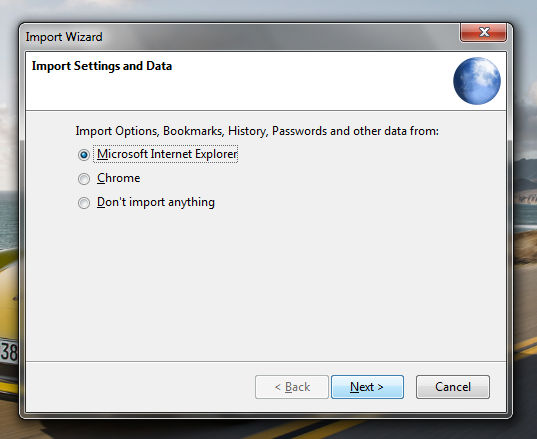
The last point here is sort of refuse to import.
Also, during installation, you will be prompted to leave the Pale Moon home page or import it from the Internet Explorer browser:

Well, that's it, then the browser will be installed and you can try what kind of Pale Moon browser it is. It seems to translate as Pale Moon .. But I could be wrong
So, after launching the browser, you will have a nasty jamb. Well, maybe some people don't care, but there is no Russian language in the browser. But don't worry, I'll show you how to implement it there!
This is what Pale Moon looks like:

As you can see - in a word, it looks good and comfortable
Immediately I see that all these unnecessary buttons, the search bar (well, the one on the side of the address bar), all these bookmarks - all this can be removed and the browser can be customized for yourself.
Now about the Russian language. We go here to this site:
palemoon.org/langpacks.shtml
Then there below we are looking for something like ru.xpi - this is the Russian language for the browser, look, here it is:
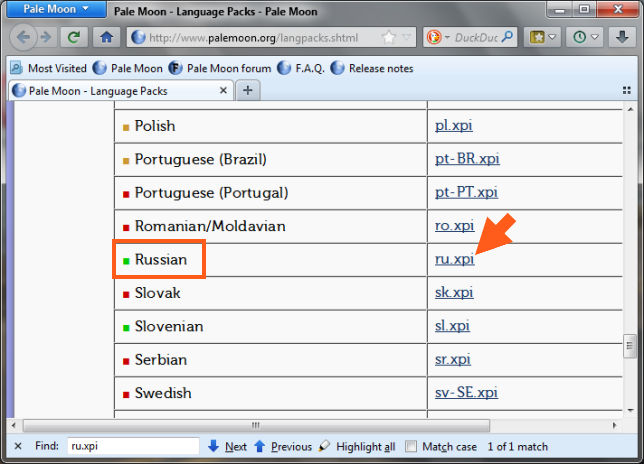
Click on ru.xpi and there will be such a window, then click Install Now:

Then you should see the following message, saying that the language is installed normally and there are no jambs:

Almost everything, now it only remains to activate the Russian language. See how to do this, first go to this address:
In the next message, click the I promise to be careful button:
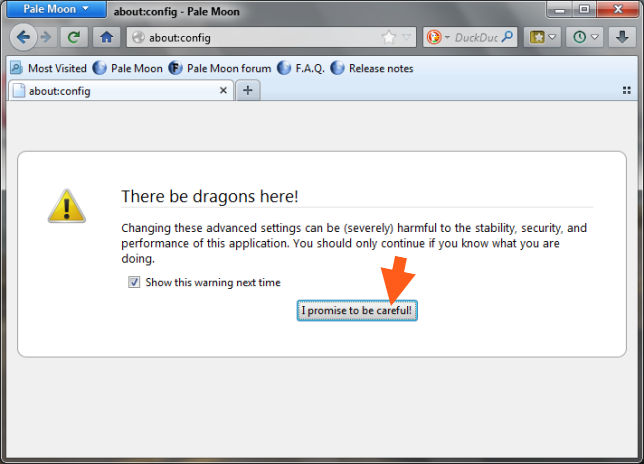
Now watch what you are doing, insert this:
general.useragent.locale
In the Search field and press enter:

There you should see the general.useragent.locale line, this line is a parameter that specifies the browser language. Here now en-US is indicated, but we need to change it to Russian! To do this, double-click on this line, the following window will appear:

And here you change en-US to ru-RU, so that it becomes like this:
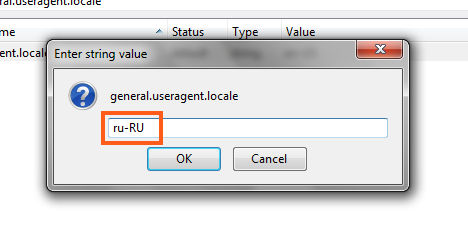
Click OK in this window and that's it, now you can press F5 for the test, if it says that there are dragons here, then you did everything right:

Now, in order for the browser to become completely in Russian, it must be closed and started, that is, restart
Well, that's it, so I opened the menu and everything is in Russian:

So there is nothing complicated here. Well, without leaving the checkout, I will also show you how to install a Russian spelling dictionary in Pale Moon!
Honestly, either I do not remember or there is simply no such setting where you can add a dictionary. Therefore, I propose to do this, here you open any page where there is a text field, for example, I opened the Yandex search engine. And right-click on the text field and check the Spell check box:

After that, right-click again and there will already be a Languages menu, and inside it the Add dictionaries item:

Then a tab will open, by the way Mozillovskaya, and that's where you need to find Russian and click on Install Dictionary. Immediately I advise you to hold down Ctrl + F and enter Russian into the search, so you will quickly find:
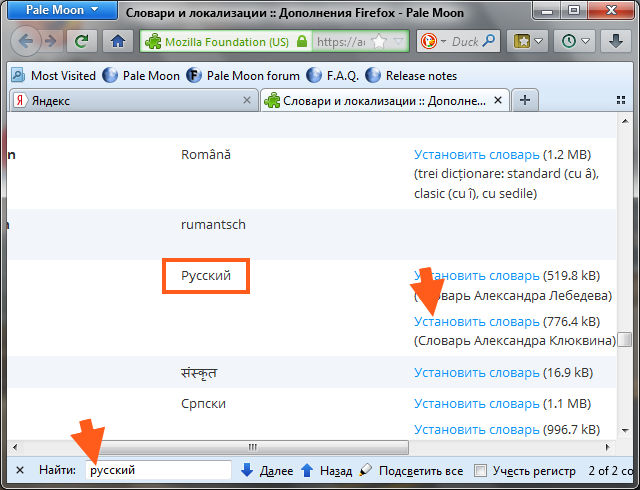
I advise you to install the dictionary that is larger. Well, there are probably more words, which means it's better to check, well, in general, I chose the one that is larger ..
Then you will need to click on Add to Firefox:
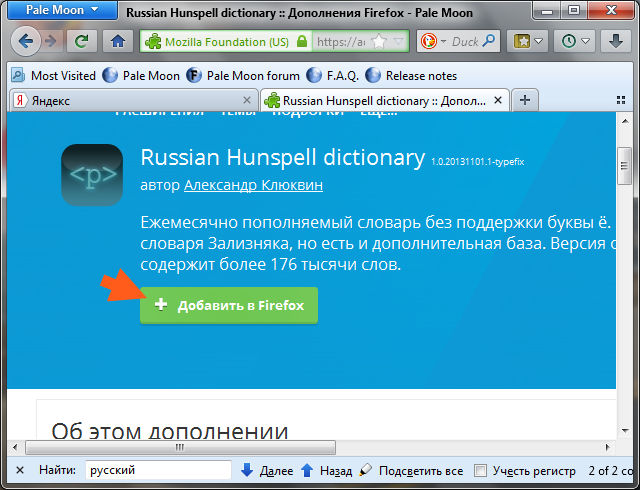

And then there will be a message saying that there are no jambs, everything is installed normally:
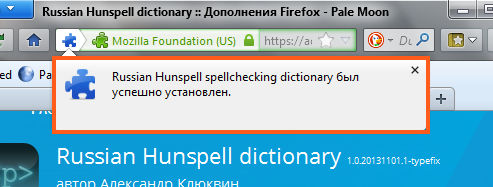
After that, you will need to check the Spelling checkbox again, and then Russian will be automatically selected:

Well, you see how it all turned out. I wanted to tell you about Pale Moon, but in the end I told you how to put Russian into it and how to add a Russian dictionary for spellchecking. Well, how else, this is the first thing you need to do to make the browser more or less comfortable to use.
By the way, here is the settings window (you can get into it if you click on the Pale Moon menu button in the upper left corner and select an item there):
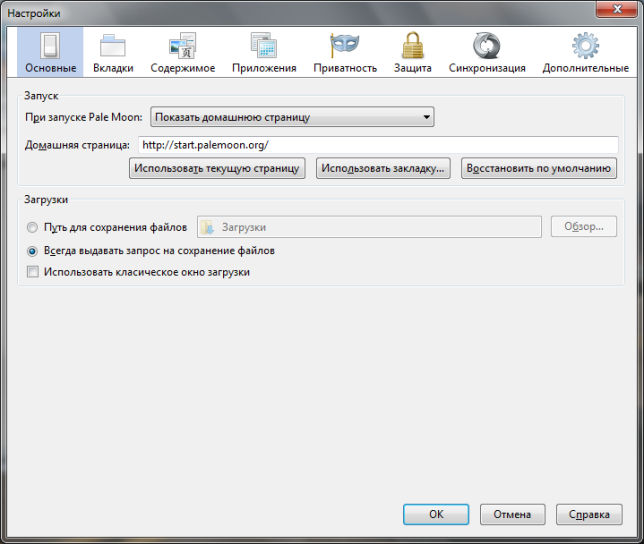
That is, you see it as if Mozilla, but not quite modern. Everything is correct. Pale Moon is not made on the latest version, but, so to speak, on the one that is still modern. In general, she supports everything, and YouTube and all sites, and flash and video, in general, everything works there. It's just that Mozilla's version, as a basis, is not the freshest, but just fresh.
I don’t know if you like this browser or not, but actually I don’t see any strong reasons why you might NOT like it. Here are the advantages I see in it:

Well, it seems that I wrote everything that I had to! I strongly advise you to try this browser and understand that I am not making it up, it is really very fast and even somewhat resembles Opera 12. And this, well, I have never met such a browser, as for me, this is the best that can be from browsers today.


